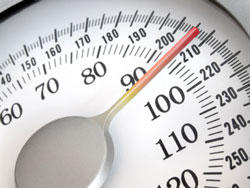Starting A Diet And Getting Results
When you're starting a diet to lose weight...

- What is the first thing you think of when you want to lose weight?
- You think of starting a diet, right?
- It seems like the most natural thing to do. You are accustomed to thinking that way by everything you hear and everything you read. "New diet! Lose weight!"
- You have high hopes when you're starting a diet. Maybe this time will be the one. You hear how so many other people lost weight. It all sounds so good.
- So there's this sort of natural connection with "going on a diet" and losing weight.
Successful weight loss
But if you really want to be successful when starting a diet you shouldn't go in blind. You ought to really take a good look at what you are doing and see if you can figure some things out. Is it really going to work? Is it the best use of your time and resources?
So, let's take a look at what these "diets" are and what they do. Unless you're the super-scientific type, you might not usually analyze something like this. But still, you would probably expect a new diet to have:
- Fast weight loss
- Easy weight loss
If not, why would you be attracted to it?
Almost all the popular diets advertise these two benefits one way or the other.
Dieting deconstructed: Seven key features of "fast-and-easy weight loss"

So how do you get this fast and easy weight loss? Well, when you look at how the diets are put together, this is what you find:
- There are foods you can't eat.
- Foods you have to eat.
- Foods at certain times.
- Dramatic changes from what you are used to eating.
- Extreme low calories -- much lower than your body needs.
- It's temporary.
- And the most important feature of all is that something magic happens...
Something magic, like "negative calorie" foods, or special ingredients that "melt away the fat," or some drugs or vitamins or supplements to blowtorch your metabolism, or maybe special food combinations so that you miraculously lose weight without going hungry.
See, this has an obvious appeal if you're overweight. After all, lots of people supposedly lost a lot of weight. It's supposed to be easy.
And you don't have to be on it forever. It's a few weeks or a few months at the most, and then after you lose the weight you can go back to eating normally.
And after that you won't have to plan what you're eating anymore. You won't have to deprive yourself. You won't have to go hungry.
Best way to lose weight

So now, let's take our list of the things you find on the usual diet, and think about whether these are right for you...
#1 -- Foods you can't eat.
Having certain foods you can't eat isn't as good an idea as you might think. There are no foods that are so bad that you can never eat them. It's true that if you make a steady diet of potato chips and ranch dressing, you're never going to get anywhere.
But here's what happens when there's something you're not supposed to eat. If it's something you really love, you might be able to avoid it for a while, but then you'll get cravings for it. Or you'll just go back to eating it when your "diet" is over. So where did that get you?
#2 -- Foods you have to eat
This one's not so bad. Why? Because if you're over your ideal weight you are doing something to make yourself overweight. It's not your genes. It's not your hormones. The universe isn't against you.
You are making poor choices somewhere. If not, you wouldn't be overweight. You've got to make some changes somewhere.
So if the diet "makes" you eat something you wouldn't usually eat, well, then eat it. It might be good discipline. This is true as long as whatever it is that you "have to" eat is nutritious. And not too weird. Cabbage soup? Well, fine, it might be nutritious. But cabbage soup three times a day for a week? No, too weird. You're not going to lose any weight that way.
#3 -- Foods at certain times
This can be good too. It can keep you from skipping breakfast. It can have you eat regularly so you don't get overly hungry -- which can lead to overeating.
So fine. Eat at regular, scheduled times. It's good discipline.
#4 -- Dramatic changes from what you are used to eating
This might be the worst one. This won't get you anywhere. Think about it. You go on a diet. The whole time you're on it you're eating food that you're not used to and that you don't like.
Well, sure, you might lose some weight. Why wouldn't you lose weight if you can hardly stomach whatever it is you're supposed to be forcing yourself to eat?
We're not talking "eat your veggies" here. Vegetables are food, plain and simple. And if you're not eating plenty of vegetables it's time to start. Get some you can eat and build from there. Be creative in how you prepare them. But somehow, if you want to live a long and healthy life, you need to figure out how to get good nutritious food inside you. And no, ketchup and French fries are NOT vegetables.
But no, this rule about dramatic changes doesn't mean including a larger variety of healthy foods in your usual diet. It means cans of food -- artificial "diet drinks." And "diet bars."
Meals in a can? Nobody would ever choose that if they didn't have to. That's not food. You don't look forward to eating that. You're just glad when you're done with it and you look forward to your one real meal of the day when you can finally have some food. Now, does eating that way really make sense?
#5 -- Extreme low calories
This is a harmful practice. Why? Well, look at the good reasons to want to lose weight. It breaks down into four categories:
- You want to look better.
- You want to feel better.
- You want to be healthier.
- You want to live longer.
So how do you get these things, looking better, feeling better, being healthier and living longer? You do it by making your body more productive. By making it more efficient. By making each and every cell of your body work better. By making the physical part of you stronger and leaner, more toned and trim and clean and vigorous.
And you don't do any of these things by starving yourself. Just the opposite. When you starve yourself you end up, one way or the other, weak and sick. You don't necessarily see the effects immediately. But they're there.
In the long run you:
- Lose energy.
- Feel fatigued.
- Get more nervous.
- Have trouble with stress.
- Develop high blood pressure.
- Have strange aches and pains.
- Suffer from digestive problems.
And your body, in struggling with these tremendous, overwhelming stresses, will just sooner or later gain back that weight.
#6 -- It's temporary
This is the elephant in the middle of the room that nobody sees. Temporary diets are almost 100% doomed to fail.
Short term diets = short term weight loss. And short term weight loss is very hard on you and your body.
It's hard on your body, because usually after a diet your metabolism isn't running higher, it's lower.
And it's hard on you -- you meaning you as a person -- because it's discouraging and disheartening and frustrating. And because it makes you believe that there is no solution.
#7 -- Magic happens
The problem is that the magic doesn't happen. Starting a diet isn't magic. There is no magic to losing weight. But there are things that work. That are effective. That are proven.
And then there's everything else. And the magic? That's sales talk. It's somebody that cares more about profits than about you. And they figure the way to get you to buy is to make promises. Garages everywhere are full of "miracle flag rollers." They made someone some profits. But they didn't roll off any flab.
The only real magic in weight loss occurs when you realize that your weight can be under your control by following some simple steps. You learn what works. When you're starting a diet you select those things that you can do. You make a plan that you can actually follow. And then you patiently apply those things in your life. It's not easy and it's not overnight. But it's the most effective way -- and in fact the only way -- in the long run.
So next time before starting a diet, run through this checklist. See how the new diet measures up. Don't do it unless it makes sense. And if you do that, you'll be successful when you weren't able to before.

Now look at these important articles for you about starting a diet and getting results:
1.Diet motivation
It isn't easy to diet. It takes some planning before starting a diet. And it takes some work. But if you do it right, the results are worth it. You can change your entire life.
To help you along toward your goal, take a look at this article about diet motivation.
2.Diet mistakes
It's easy to make mistakes when you are starting a diet and losing weight. And when you do, all your hard work and effort can end up in failure. You want to avoid mistakes and really be successful this time.
So be sure to take a good look at this information about diet mistakes.
3.Healthy body fat percentage
There is a lot more to starting a diet and effective weight loss than "eat less, exercise more." Every little bit of truth you can gather will help you. Sometimes you just need that extra bit of information when you're starting a diet and everything falls into place.
Do you want to get lean and stay lean? Be sure to read this article that explains everything you need to know about getting a healthy body fat percentage.
4. The perfect diet
Now, some diets are awful. Some are fair. Some are good. And some are excellent. But when you're starting a diet shouldn't you be following the very best diet for you? Here's what you'll want to know about the perfect diet.
5.Jump start your metabolism
Your metabolism has a lot to do with how hard or how easy it is for you to lose weight. If you can speed up your metabolism you'll have an easier time of it when starting a diet. Fortunately there are some things you can do. Read here about ways for you to jump start your metabolism.
6.Teenage weight loss
The longer you wait to lose weight, the more difficult it becomes. Bodies slow down as the years pass. It becomes harder to get active if you haven't stayed active all along. Starting a diet gets that much more difficult.
Take a look around the world. People are gaining more weight and it's happening at an earlier age. So when's the time to start getting good habits that will keep you lean for your whole life?
The answer to that is as early as possible. Here's some helpful information about how teenagers can lose weight and keep it off.
Popular articles:
With weight loss, knowledge is power...
If you know these few truths on this page -- and if you apply them consistently in your life...
If you can't stay on it forever and be fit and healthy and strong -- then it's an extreme diet.
Here's the easy way to ruin any slightest chance you have of losing weight...
Can you eat in restaurants and still respect yourself in the morning?
Calorie density is the difference between vegetable soup and a bagel.
Hidden calories that ruin your waistline...
Will it really help to drink water to lose weight?


